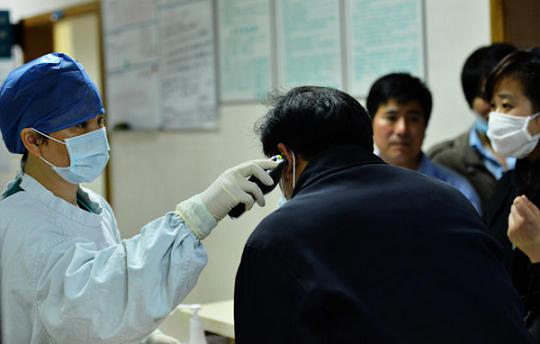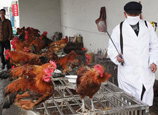
 |
| A doctor examines a patient at a fever clinic at the No 1 Hospital of Zhejiang University in Hangzhou. (Long Wei / Xinhua) |
Anger and resentment
"We stopped selling birds on Saturday," said Fan Qi, owner of the Xiao Fan Store at Wanshang flower and bird market. Now, only one bird remains at the store, Fan's own pet. "Nobody wants to buy birds now," she sighed.
Other storekeepers expressed anger at the ban. One seller, in his 40s, raged about the move. "Our birds are totally safe. They were raised in isolation with no contact with the wild birds that are said to carry the virus," he said.
At lunchtime on Sunday, about 20 birds were still visible in individual cages at his store, although the door was half shut to prevent prying eyes. "Why should we close our store? How can we make a living without selling birds?" he asked.
While many salespeople have been badly affected by the strain of bird flu, restaurants are reported to have been affected too.
However KFC, McDonald's and a number of other fast food restaurants in Shanghai that mainly sell chicken, still served a lot of customers on Sunday, most of whom chose to eat chicken and seemed untroubled.
"I've heard the news about bird flu, but I'm not afraid of it. The experts said that there is no harm in eating chicken if it's been cooked at a high temperature," said one KFC customer.
Meanwhile, the Shanghai authorities have ordered the closure of public squares and parks where residents feed wild pigeons. According to the management office of People's Square and Century Park, all the wild pigeons have been caged and the authorities have carried out cleaning and sterilization work.
Shanghai Racing Pigeon Association also announced that it has cancelled all races to avert a potential spread of the virus and Shanghai Zoo said it is stepping up monitoring and sterilization work.
Monitoring in the zoo, especially in the swan lake and bird enclosures, has been strengthened. If dead birds are discovered, they will quickly be sent for tests, according to a zoo official.
Unanswered questions
Despite ongoing efforts such as enhanced virus surveillance, epidemiological studies, and measures to control potential sources of exposure, "there remain some essential facts we don't know yet", said Feng Zijian.
First, how clinically serious is the human infection? So far most reported H7N9 cases have been fatal or severe, but a more general picture - including the proportion of mild and medium cases, in other words, the clinical severity - has not yet fully emerged, and knowledge about the full spectrum of the disease remains limited, he said.
A second unanswered question is how easily can the virus jump from birds to humans?
Third, is a vaccine necessary and if so, how difficult would it be to develop one? While no specific medication for H7N9 is yet available, the WHO said that the virus is vulnerable to some existing flu treatments, including the drugs Oseltamivir and Zanamivir. However, some experts believe that a specific H7N9 treatment could only be developed at the expense of developing vaccines for seasonal flu, according to reports by Reuters.
Meanwhile, the virus has already been isolated and characterized by studies conducted on the initial cases, according to the WHO. The first step in the development of a vaccine would be the selection of candidate viruses upon which a vaccine could be based.
The WHO, in collaboration with its partners, will continue to characterize available H7N9 viruses to identify the best candidate viruses, which could be used for the manufacture of vaccine, if that step becomes necessary.
But it would likely take months, at least, to produce the first doses, said Feng.
Another major question regarding the virus is: which groups are likely to be most susceptible, he added. The National Health and Family Planning Commission has distributed prevention and control plans acknowledging that those at high risk include poultry raisers, sellers, butchers and meat processors.
"More biological information about the high-risk population needs to be known," explained Feng.
However, "we can see that the proportion of vulnerable people remains low", he stressed.
For Zhong Nanshan, the big question is whether the H7N9 virus could cause a pandemic. "Given that reported cases remain limited at the moment it's a little hard to tell where this will go," he said, adding that so far there has been no evidence of person-to-person transmission.
A 2007 study jointly conducted by Columbia University in the US and the Infectious Diseases Center at Peking University found that the H5N1 bird flu virus can pass from pregnant women to their unborn children. A 4-month-old fetus that died along with its mother after she contracted the virus, was also infected, it said.
In addition, the study found that the virus not only affects the lungs, but also passes through the body into the gastrointestinal tract, the brain, liver and blood cells.
Despite the findings, Feng said there is no need to panic, because this type of mother-to-fetus transmission is extremely rare. "That single case alone doesn't demonstrate that the bird flu virus can be transmitted among the human population," he stressed.
However, given that the recent cases of H7N9 are the first ever seen in humans, continual vigilance is essential, he said.
Peng Yining and Wang Qingyun in Beijing and Zhang Xiaoxian in Shanghai contributed to this story.

















 Our luxuriously departed Paper-made "luxury" goods replace paper money as top offerings to the dead during Qingming
Our luxuriously departed Paper-made "luxury" goods replace paper money as top offerings to the dead during Qingming


![]()
